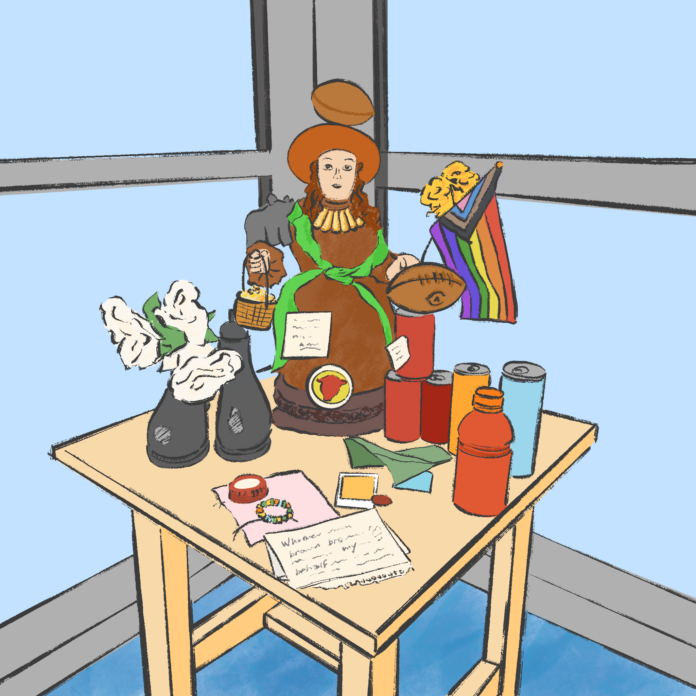Our pursuits for connection in all of its obscurity
By NEVAEH KARRAKER — opinion@theaggie.org
Constantine, a Roman Emperor, sheathed by dull ceramic. As remarkably as the passing of the Edict of Milan, the statuette materialized on the Cuarto dormitory steps amidst a foggy morning. The news of a gnome-sized brunette girl in a strawberry-colored hat spread through the halls faster than the swift evolution of autumn.
Almost overnight, small offerings of flags, soda cans, plastic footballs and other knick knacks encircled her blue dress. Like these offerings, student homesickness only seems to increase as the quarter progresses. Living in the dorms and moving to Davis, it’s generally the first time students have fully experienced adulthood. And with this change comes the immersion into a new culture and people.
Unfortunately, as much as starting college is an exciting change, it is, in the end, change. No matter how good or beneficial it can be, we are inescapably resistant to it.
This is partially because we never truly realize what we have lost until it is gone. Further, we find ourselves reminiscing on the people we miss, the silly events we actually cherished and the dissipating feeling of belonging. Undoubtedly, as humans we are linked by the simple desire to connect — being social is a fundamental, psychological need we crave. However, when everything gets thrown up in the air due to the inevitable change we call life, we often find ourselves resorting to extreme measures. In our humble yearning for connection, it can transgress into unhealthy obsessions and idolizations.
Constantine is thus a temporary symbol of what we all want: a way students can generate laughter and conversation. To an extent, it is a direct reflection of interactions at a lively family dinner.
Yet, we cannot replicate what we once had. One friendship is unfortunately not going to resemble another. Similarly, Constantine cannot replicate the community first-years had in their hometown. A new one will instead unfold; It will be different, possibly unfamiliar, but it will be fulfilling.
The reality is that it takes time to accept this. And, before we do, we might make numerous, futile attempts. For instance, while it could be an insignificant joke to give offerings to a ceramic doll, should students really be sacrificing to false idols as a way to induce friendships? Or are there more authentic methods?
The answer is clearly ambiguous. Absolutely continue to joke and discuss the influence of Constantine; after all, our dear friend does elicit an important aspect of culture — unification. However, it is important to take into account that he conversely represents our desperation and ignorance while we search for those we have the privilege to call “our people.” It demonstrates the dangers of assimilation and conformity. Thus, our endeavors of pursuing something can sometimes end up diminishing it, or worse, decreasing its inherent value.
Nevertheless, the students in Cuarto have simultaneously demonstrated a unique phenomenon. We have the power to befriend others. The only thing that’s required of us is boldness. Someone had to decide to put Constantine on those steps, and someone had to choose to sacrifice the first offering. Hence, not only does everyone have this desire for connection, but anyone has the capability to follow through on it.
In theory, we could patiently wait for a figurative Constantine to be placed in front of us, but sitting back and doing nothing is certainly not equivalent to faith. In fact, that is borderline indolence. Rather, we need to take initiative to generate our own opportunities. Perhaps it is up to us to courageously utter the first “hello,” for we truly may never know what will result from it.
Written by: Nevaeh Karraker — nakarraker@ucdavis.edu
Disclaimer: The views and opinions expressed by individual columnists belong to the columnists alone and do not necessarily indicate the views and opinions held by The California Aggie.









